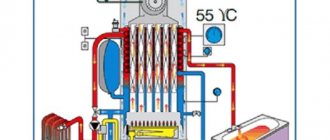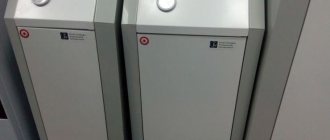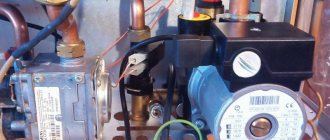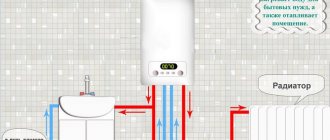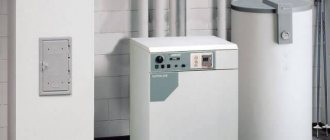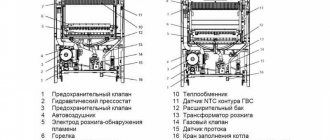Many residents, especially in multi-apartment city buildings, often hear extraneous sounds that appear and spread in the heating system. At the same time, people wonder why heating pipes are knocking? There is only one answer - problems in the system that appear as a result of violation of installation and operation rules.
Pipes are usually installed from steel. This type of metal is an excellent conductor of sound waves. In addition, it is necessary to take into account the round shape of the heating pipes, which contributes to the spread of extraneous sounds and noises.
All noise in heating pipes can be classified into several types:
- hum in the pipes;
- small crack;
- periodically appearing clicks;
- small knock.
The above noises not only reduce the level of living comfort, but can also cause leaks and serious accidents during the cold season. And this risks causing the temperature in the house to drop significantly during the renovation work. Let's try to understand the causes of these extraneous noises and ways to eliminate them.
Noise in heating pipes
There may be several answers to the question of why heating pipes hum.
The main ones:
- water leak in the heating system;
- reduction in pipe diameter due to the formation of limescale on the internal walls
- installation of smaller products.
If you hear a humming sound in your pipes, you should first look for a water leak. If a walk around the neighboring apartments did not yield anything, then this sound probably comes from the basement, where the main communications of the heating and plumbing system of the house pass.
It is not difficult to see where heating pipes are leaking - a small cloud of hot steam always appears in this place and a trickle of water flows.
After this, you need to call a plumber to repair the damage. The causes of water leakage can be: an unclosed valve that discharges excess air from the system or damage to the pipe in the form of a fistula. It can sometimes be difficult to find due to its small size. In addition, it may be located under layers of thermal insulation material.
Experts do not recommend troubleshooting the heating system on your own, but sometimes you have to wait a long time for a qualified worker. In winter, problems with heating often arise and good plumbers sometimes simply do not have time to respond to all calls. However, many homeowners consider themselves experts in this area and often repair minor damage themselves. If they live in your house, then you are simply lucky.
Before the start of the heating season, plumbers install special washers in the elevator unit to reduce the flow of hot water to save its consumption. Therefore, radiators in apartments are often cool. Some residents take them out and at the same time connect pipes and communications poorly. This requires some knowledge and skills. In addition, it is advisable to turn off the entire system for a while.
If the inspection of the pipes does not give positive results, then it is necessary to continue research into why the heating pipes are noisy.
The next reason may be a reduction in the working diameter of the heating pipe. In order to find the location of the noise, you need to walk along each pipe and try to detect the source of the noise by ear.
In large houses, noise can usually occur in the basement, where water flows through the pipes at a higher pressure than in apartments.
The narrowing of heating communications can be caused by the following factors:
- Failure of shut-off valves, as a result of which foreign particles of slag or rust may enter the system.
- The formation of plaque on the inner walls of pipes, which reduces permeability and increases the pressure of hot water in a given place.
This cause of noise can be eliminated by replacing pipes and old worn valves.
It is better to use ball-type shut-off valves - such problems rarely arise in them.
You can also open the water discharge valve for a short time above the narrowing point. In this case, foreign particles may escape from the heating system.
Sometimes other incidents arise when residents of some apartments complain that the heating pipes are noisy. The reason can be very simple - some apartment owners flush the heating system by opening the shut-off valve. They believe that after this the temperature of the pipes and radiators in their home will increase.
However, such a procedure cannot have the desired effect. The result is a high level of hot water consumption, which will then affect the cost of heating the entire house.
Periodic clicking and bubbling of water
Noises of this kind can be caused in heating pipes by the appearance of air in the system and the presence of foreign solid particles of debris or remnants of damaged communication elements. Even high-quality sound insulation of heating pipes will not save you from such noise. Through metal pipes and radiators, sound will travel a long distance.
If air appears in the system, this will be indicated not only by noise, but also by a drop in temperature,
since the air will impede the movement of the coolant. In apartments on the upper floors, as a rule, Mayevsky taps are installed in the heating system, which are designed to discharge excess air.
Therefore, you should go up to your neighbors and ask them to bleed the air from the heating system using these devices.
If this procedure does not help, then you need to look for incorrect installation of pipes to the radiator, the distortion of which can cause unpleasant sounds.
Sometimes periodic clicking and crackling sounds occur in radiators and heating pipes.
Cracking in heating pipes can be caused by several reasons:
- the presence of foreign particles of debris or worn parts in the pipes or radiator;
- broken ventilation valve;
- metal expansion due to unstable operation of the heating radiator.
Small particles of debris or slag create crackling and clicking sounds when hot water moves. This effect can be eliminated in a simple way - connect the hose to the tap, open it, and pour the water with debris into the toilet. After this procedure, the question of why the heating pipes click may no longer be asked.
Pipe humming due to water hammer
The cause of clicks or knocks can also be a phenomenon such as water hammer. The reason for this is that water, under the influence of inertial forces, cannot instantly stop in the pipe. If the circulation of water in the system is temporarily suspended (for a variety of reasons), then the water, suddenly encountering an obstacle, hits the inside of the pipe. This is called water hammer. You can control the flow of water depending on the temperature using special regulators.
Note! Water hammers and water noises in the heating pipe occur at the moment when the water is completely shut off. After all, liquids are practically incompressible, therefore, inertia cannot be extinguished instantly. Where the water flow stops, the pressure can reach tens of atmospheres. In turn, this can be fraught not only with unpleasant noise, but also with the destruction of system connections, tearing out valves and even rupture of batteries.
Water hammer can occur anywhere in the system. Including even a heated floor system. Accordingly, in this case the knock will be heard under the floor. The strength of the water hammer can be affected by the length of the pipeline. In a heated floor system, it is the most dangerous, since here the pipes are folded over a very large length. Water hammer is also dangerous if a thermostat is installed at the outlet of the heating system. Structurally, it can withstand pressure up to 4 atmospheres, in this case no knocking is observed.
This figure shows the water pressure in the system and the cause of water hammer.
Knock in the heating system
The cause of a knock in the system may be a broken ventilation valve. This situation is quite common due to improper installation.
The fact is that if the valve is placed in the opposite direction, then erosion occurs on it, which leads to its breakage.
This is a serious situation and will result in the hot water flow being blocked. In this case, an emergency shutdown of the heating riser is necessary, because the water pressure will increase sharply, and ruptures of pipes and radiators may occur in weak spots. After repairs, which should only be carried out by heating specialists, the knocking noise in the system will disappear.
However, if the communications of the house are worn out, then major repairs will most likely be required, which should only be carried out in the summer when the heating is turned off.
In this case, a short-term stop of the home heating system, even during cold weather, is justified.
The next situation where extraneous noise appears is that due to a change in water temperature, a change in the shape of the metal occurs. When heated, steel objects expand, and when cooled they narrow slightly. If the pipe is attached to the wall with brackets, then the cause of knocking may be weak fasteners of this element. When temperature fluctuations occur, the bracket will move and slowly knock on the steel pipe.
This phenomenon occurs quite often, especially in old houses. If the fastening parts of the heating system are loose and completely torn off, then a soft knocking sound in the heating pipes or in the radiator is guaranteed.
Some may say that the temperature of pipes and radiators is always constant. Yes, this should be so, but very often the system’s communications flow either hot water or cold water. This fact indicates that cold air is entering some area. In an apartment, even a vent or window that may be open for some time for ventilation can cause this sound effect.
You can often see that in the entrances of some houses, even in severe frosts, windows are open or their glass is broken. Therefore, residents should not rely on the management company to eliminate this defect. You can seal the windows in the entrance at low cost, without waiting for special workers to arrive.
If the bracket is loosely fastened tightly to the wall, then clicks in the heating pipes will not be heard. In this case, a creaking sound will spread.
As can be seen from the above, there may be several reasons for the appearance of extraneous and unpleasant sounds in the heating system. However, they have one thing in common - a high degree of wear and tear on pipes and radiators in houses. Of course, only major repairs will help to completely eliminate these defects, but sometimes you have to wait a relatively long time for it. Therefore, in the summer, every apartment owner is able to inspect his home and independently fix minor problems with the heating system.
Sometimes a small gasket under the fasteners of pipes and radiators will help eliminate extraneous sounds. And if you seal all the problem areas with cement mortar or foam, then the pipes will probably stop knocking.
Much depends on the company that services the house, but sometimes it is necessary to take personal part in eliminating all the shortcomings in your home.
Causes of noise
There are actually not so many reasons for knocking in heating pipes when heating. Some noise can be ignored - it does not harm the system or heating devices. But noises such as buzzing, crackling, knocking, gurgling, and howling should give reason to think and take urgent action.
- air pockets in the system;
- clogging or overgrowing of pipes due to poor-quality coolant;
- leaks in the pipeline;
- violation of installation work when installing taps, valves and laying pipes;
- failure or wear of working equipment;
- cavitation, an increase in pressure in places where the diameter of pipes increases (decreases);
- incorrect calculation or non-compliance with design recommendations when installing the heating system.
These circumstances arise in private closed-loop systems and make us think about their urgent elimination.
The circulation pump in the heating circuit system promotes forced movement of water, which leads to uniform heating and displacement of accumulated air from the system.
If the heating in a house or apartment is connected to a central pipeline, then startup, accompanied by similar sounds, is normal. Water, filling the general system, pushes out air, and, flowing along the contour, is accompanied by gurgling, knocking and crackling sounds.
As soon as the equipment enters operating mode, the general adjustment of the system will end - the temperature of the batteries will increase, and everything will stop. This is clearly visible in the diagram of heat supply to consumers from the central boiler house.
